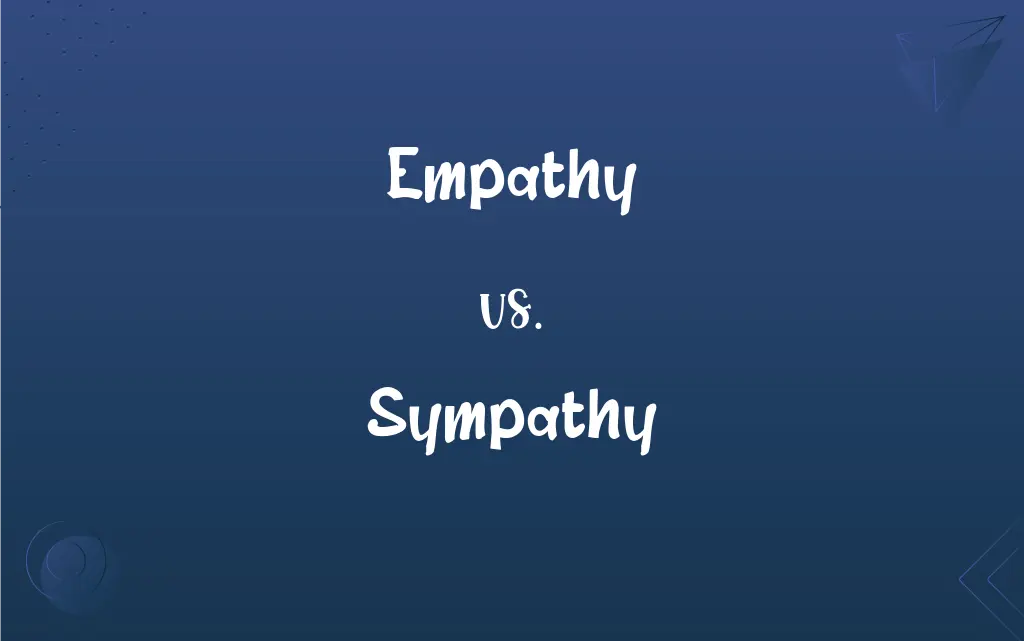Empathy vs. Sympathy: What's the Difference?
Edited by Janet White || By Harlon Moss || Updated on October 13, 2023
Empathy involves understanding and sharing others' feelings, while sympathy involves acknowledging others' hardships and providing comfort.

Key Differences
Empathy, as a term, conveys a deeper emotional resonance, as it encapsulates a personal understanding and shared feelings concerning another individual's emotions or experiences. On the other side, sympathy doesn’t require a shared emotional experience, instead reflecting a compassionate acknowledgment and concern for another’s misfortune or sadness. Empathy often entails a personal connection or commonality with someone else’s emotional state, while sympathy might be conveyed even without a deeper emotional resonance or understanding.
Empathy can be seen as placing oneself in another's shoes, genuinely feeling their emotions and understanding their perspective. Sympathy, meanwhile, might involve recognizing another's emotional state and expressing concern, but without the same depth of shared emotional understanding. Empathy often necessitates a level of vulnerability, wherein one accesses their own similar experiences to genuinely connect with the other person's emotions. Sympathy can be expressed from a more detached stance, providing comfort without diving into a shared emotional state.
While both empathy and sympathy can facilitate emotional support, empathy often leads to a closer, more intimate connection through mutual understanding and shared experiences. Alternatively, sympathy, while compassionate, may maintain an emotional distance, acknowledging another's pain but without intimately experiencing similar emotions. Empathy can sometimes be emotionally draining, as it invites an authentic sharing of emotional states, while sympathy might protect one’s emotional wellbeing through maintaining a supportive, yet somewhat distanced, stance.
Empathy tends to be more relationship-oriented, fostering deeper connections and emotional alignment with others. In contrast, sympathy might be more solution-oriented, recognizing another's pain and perhaps offering solutions or aid without the necessity of feeling their emotions in a shared capacity. Empathy often involves a shared emotional journey, while sympathy may lean more towards providing external support, comfort, or assistance without a shared emotional burden.
In the realm of emotional intelligence, empathy might guide actions and responses based on a deep, personal understanding of another’s emotions, navigating towards shared feelings and support. Sympathy might navigate more towards consoling and assistance, focusing on providing comfort and possible solutions to alleviate another’s distress. Empathy often leads to a reciprocally emotional interaction, while sympathy might be a unidirectional provision of comfort and care.
ADVERTISEMENT
Comparison Chart
Emotional Depth
Involves sharing and understanding feelings.
Involves recognizing and acknowledging feelings.
Emotional Distance
Often entails emotional closeness.
Can maintain emotional distance.
Interaction
Leads to mutual emotional sharing.
May be a one-sided emotional interaction.
Emotional Impact
Can be emotionally consuming.
May preserve one's emotional state.
Focus
Centered on shared emotional experiences.
May be oriented towards providing comfort or solutions.
ADVERTISEMENT
Empathy and Sympathy Definitions
Empathy
Empathy is the ability to understand and feel another person's emotions.
His empathy allowed him to provide genuine support to his grieving friend.
Sympathy
Sympathy embodies compassionately recognizing another’s pain or suffering.
Her words of sympathy provided a small comfort to those experiencing hardship.
Empathy
Empathy allows for emotional connections through shared experiences.
Their empathy towards each other strengthened their friendship during hardships.
Sympathy
Sympathy involves acknowledging and expressing compassion for another's misfortune.
His sympathy was evident when he consoled his friend after the loss.
Empathy
Empathy entails diving into others’ emotions while respecting their feelings.
Her empathy enabled her to carefully navigate her friend's emotional turmoil without being overbearing.
Sympathy
Sympathy sometimes involves external expressions of concern and consolation.
The sympathy card conveyed her warm thoughts towards the bereaved family.
Empathy
Empathy involves sharing emotional experiences with others.
Through empathy, she could relate to the anxiety her sister felt.
Sympathy
Sympathy enables offering comfort without sharing the same emotional state.
She offered her sympathy to the grieving family by sending flowers and a card.
Empathy
Empathy sometimes means holding space for others' emotions without judgment or solutions.
His empathy allowed him to just sit and listen while his friend shared his struggles.
Sympathy
Sympathy can be a gentle acknowledgment of another's emotional distress.
His nod of sympathy conveyed understanding and support during her tough times.
Empathy
The ability to identify with or understand the perspective, experiences, or motivations of another individual and to comprehend and share another individual's emotional state.
Sympathy
A feeling of pity or sorrow for the distress of another; commiseration.
Empathy
The projection of one's own feelings or thoughts onto something else, such as an object in a work of art or a character in a novel or film.
Sympathy
Often sympathies An expression of such feeling
Offered her sympathies to the mourning family.
FAQs
How is sympathy defined?
Sympathy involves acknowledging and expressing concern for another person's suffering or misfortune.
What is empathy?
Empathy is the ability to understand and share another person's emotions and experiences.
Can sympathy be expressed without shared feelings?
Yes, sympathy can be expressed without sharing the same feelings, focusing on acknowledgment and consolation.
Can empathy improve relationships?
Yes, empathy can enhance relationships by fostering understanding and emotional connections.
Can you show sympathy without using words?
Yes, sympathy can be conveyed non-verbally through gestures like a comforting touch or sympathetic look.
Is empathy about sharing emotions?
Yes, empathy involves sharing and understanding the emotions of others.
Can sympathy be negative?
Sympathy is generally positive, although it may be perceived differently based on the recipient’s perspective and needs.
Can empathy be selective?
While empathy itself is a general capability, individuals may selectively empathize based on personal biases or connections.
Can empathy lead to emotional fatigue?
Yes, since empathy involves sharing emotions, it can sometimes lead to emotional fatigue or burnout.
Does empathy require personal experience?
Not necessarily, but empathy often involves understanding emotions, which may be aided by related personal experiences.
Does empathy mean agreeing with others’ feelings?
No, empathy involves understanding and sharing emotions without necessarily agreeing with them.
Can you have sympathy for positive situations?
Sympathy is generally related to challenging situations, whereas congratulatory sentiments are for positive scenarios.
Does empathy always involve emotional comfort?
Empathy involves sharing emotions and may provide comfort through understanding and validation.
Is empathy a skill?
Yes, empathy is considered a skill that encompasses understanding and sharing emotions constructively.
Is sympathy always related to sadness or misfortune?
Typically, sympathy is expressed towards suffering or misfortune, offering comfort and concern.
Can sympathy be conveyed through actions?
Absolutely, actions like providing help or sending a sympathy card are common ways to express sympathy.
Is sympathy a form of pity?
Sympathy may resemble pity in expressing concern, but it generally conveys a kinder, more considerate acknowledgment of misfortune.
Can empathy be learned?
Yes, empathy can be developed through practices like active listening and trying to understand others’ perspectives.
Can you express sympathy to a group?
Yes, sympathy can be expressed to a group, like offering condolences to a bereaved family or community.
Can sympathy evolve into empathy?
Potentially, as understanding deepens, sympathetic feelings might evolve into empathetic connections through shared emotions.
About Author
Written by
Harlon MossHarlon is a seasoned quality moderator and accomplished content writer for Difference Wiki. An alumnus of the prestigious University of California, he earned his degree in Computer Science. Leveraging his academic background, Harlon brings a meticulous and informed perspective to his work, ensuring content accuracy and excellence.
Edited by
Janet WhiteJanet White has been an esteemed writer and blogger for Difference Wiki. Holding a Master's degree in Science and Medical Journalism from the prestigious Boston University, she has consistently demonstrated her expertise and passion for her field. When she's not immersed in her work, Janet relishes her time exercising, delving into a good book, and cherishing moments with friends and family.































































